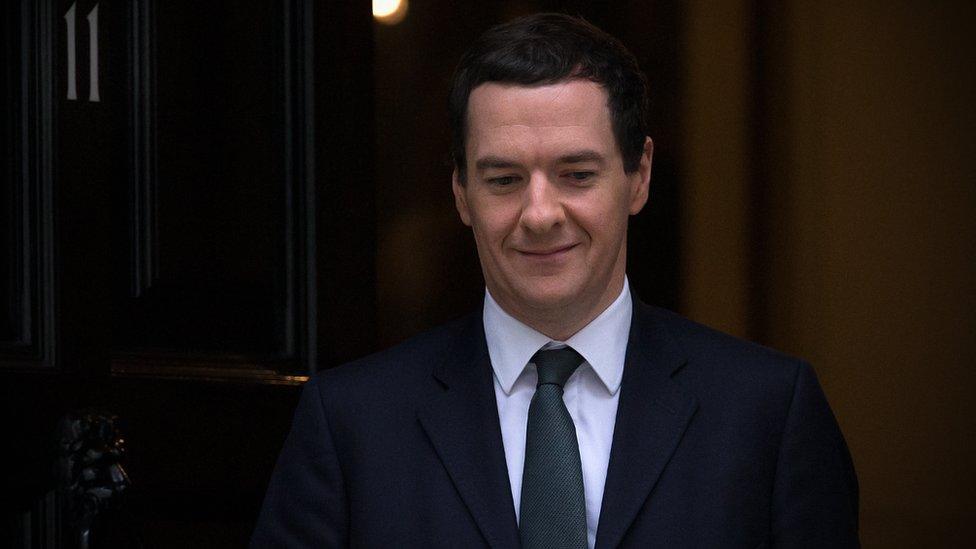How much of a savings buffer do people need?
- Published

The UK government is promising to help low-earners protect against hard times by topping up savings. But what constitutes a sensible "buffer" these days?
Nasty things happen in life. You could lose your job, divorce or be stung for a rent hike or an expensive building repair. You could just have to pay an unusually high gas bill or replace a stolen laptop. Your car could break down, or you could face transport costs for a faraway family funeral.
If there's nothing, or next to nothing in the bank, these events are hard to cope with - as you have to go on eating and buying clothes.
So how much money should people have squirreled away for a situation like those above?
Anti-debt charity Step Change says that, if every household in the UK had £1,000 saved, it would reduce the number falling into problem debt by half a million.
Martin Lewis, founder of MoneySavingExpert.com, recommends setting up an emergency fund to the value of "at least six months' worth of bills", although three months' worth "wouldn't be too bad". But he concedes this is "going to be hard", particularly for those on low incomes.

The latest official figure, for December last year, put the average UK weekly wage at £496. Many, many people earn much less, of course, but this sum would give a typical person weekly take-home pay of just under £400.
The US-based financial site Money Under 30 differentiates between a "buffer" for cashflow problems and an emergency fund for major events. It recommends keeping between one week's and two weeks' take-home pay as the buffer. Translated to the UK, this would mean saving between roughly £400 and £800.
An emergency fund should allow for between six and nine months of expense, it adds. If these were to come to £1,000 a month, that's between £6,000 and £9,000.
But such a level of savings is in the realm of fantasy for many Britons.
A survey by the Money Advice Service has found that four in 10 adults in the UK do not have £500, external or more in savings. Another by ING bank suggests 28% of UK adults have nothing at all in the bank.
Ahead of Wednesday's Budget, Chancellor George Osborne is promising to incentivise saving by people on low incomes, topping up accounts by as much as £1,200. But how much do you need to protect yourself against penury these days?
Simon, 46, from Withernsea, East Yorkshire, was wrongly paid £230 a week in child tax credits, despite querying this several times. Eventually he was told there had been an error and was asked to repay more than £5,000. The outgoings he had accrued, including his mortgage and bills, meant he eventually got into more than £18,000 of debt before contacting Step Change for help.

"It made things really hard for a while," Simon says. "We had to sell off everything we could - a car, stuff we offloaded in jumble sales. You never know what's going to happen but I'd recommend saving up at least six months of pay after tax, but it's very difficult." Simon earns £34,000 a year so, after tax, it would involve him putting about £12,000 into his account.
Lianne, an agency worker from Port Talbot, South Wales, aims to save £7 a week, but says she often has to "take it out to pay larger monthly bills", even though she earns above the minimum wage. "All in all I struggle massively to make ends meet from week to week," she says, "and there's no way I'd be able to save and keep those savings in an account continuously through the year."
"You have to work out what's reasonable for you," says Yvonne Goodwin, managing director of Yvonne Goodwin Wealth Management. "How long could you get by if you weren't working? Most people stick their heads in the sand. They really don't want to think about it, which is the wrong thing to do."
Expenses, rather than income levels, are what people should focus on when working out how much they need to save, says Goodwin. "If you are earning £2,000 a month and you've got £1,000 going out in expenses and you might be out of work for three months, then you'll need £3,000 put aside. Who knows, you might be out of work for six or nine months."
People should clear expensive debts before saving anything. Lewis warns against putting money into savings accounts - with interest rates at around 1% - if this involves having to keep debt on credit cards, where rates above 20% are common, arguing it would be "perverse" to do so.
It would be better to pay off the credit card debt and leave the bank account empty in this situation, still allowing the use of a credit card in an emergency. Even with the bonus the government is paying low-income savers under Help to Save, it's best to stay away from long-term credit card debt, Lewis says.

Can George Osborne encourage low-earners to save?
"Having just a couple of thousand pounds in the bank would be great for me," says Lianne, who has resisted getting a credit card, "but there's no way I can get even halfway to that at the moment. I've got about £100 in my account. It can make you feel vulnerable not having more, in case you miss a month's work, but there's not a great deal I can do."
Andrew, a construction worker in his early 30s from Birmingham, and his wife are saving up for a deposit on a house - their joint earnings are £35,000 a year. "We're managing to get £150 a month put aside," he says. "That's really hard. If something happened the only way we'd have available to deal with it would be to go into the deposit money."
Osborne is fond of reminding the public that, on the macro-economic level, it's important to "fix the roof while the sun is shining" and Help to Save aims towards the same outcome for low-income individuals.
The scheme, starting in April 2018, will award a bonus of up to £600 to those who save £50 a month for two years. That will be repeated two years later if the saving continues at the same rate.
So, altogether, the government will give up to £1,200, on top of savings of £2,400. Excluding interest, that will mean savings - or a buffer or cushion - of £3,600.
Help to Save is open to those with minimum household earnings equivalent to 16 hours at the National Living Wage - roughly £6,365 in 2017-18, the government says - or those in receipt of Working Tax Credits.
The award of the bonus depends on people on low income putting away at least £50 a month for four years.
But for many people, that level of saving will remain a pipe dream.
Follow Justin Parkinson on Twitter @justparkinson, external
Subscribe to the BBC News Magazine's email newsletter to get articles sent to your inbox.